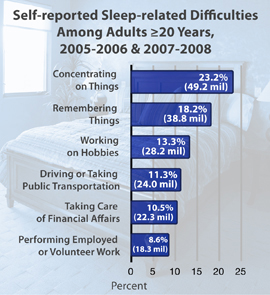
“Sleep is Overrated”

I have overheard many people say, “Sleep is so overrated!” or “I’ll sleep when I’m dead” as if to wear a badge of chronic sleep deprivation is leading to more productivity and success. This mindset couldn’t be further from the truth for you and your patients. Diabetes, heart disease, hypertension, hormone disruption, increased stress, and increased inflammation are linked to persistently poor sleep. This month we will look at the staggering statistics related to substandard sleep habits, sleep disrupters, and chronic diseases linked to sleep disruption. The next article will outline healthy sleep patterns and brain wave activity during sleep, as well as additional treatments and lifestyle modifications that will positively affect sleep.

Table 1 describes the decreased productivity from self-reported sleep-related difficulties. This is just the tip of the iceberg. One study reported that three nights of 4 hours of sleep is like functioning at a .05 blood alcohol level with increased depression, anxiety, more sadness, mental exhaustion, less optimism, and sociability. Sleeping less than 5 hours per night increased overall mortality risk by 15%. Sleep deprivation is responsible for a two-fold increased risk of a work-related injury. The National Highway Traffic Safety Administration reports drowsy driving is responsible for at least 100,000 automobile crashes, 71,000 injuries, and 1,550 fatalities yearly. The upside is when healthy sleep patterns are restored, normal function can also be restored.
So, what is responsible for all of this sleep disruption?
Caffeine
It can take some people 12 hours to completely clear caffeine from their bodies. So that 3 pm Starbucks will definitely upset the sleep cycle by continuing to stimulate the sympathetic nervous system and adrenals. Advise patients to have their last caffeinated beverage before 10 am so the caffeine will be completely cleared before bedtime.
Alcohol
Although it may seem like that nightcap relaxes and induces sleep, it disrupts sleep rhythm. It acts as a sedative, but as the blood alcohol level drops, cortisol kicks in and awakens the body. This will also affect GERD by reducing the tone of the esophageal sphincter. A 2-3 hour window between the last drink and bedtime will decrease the disruption.
GERD
This is often undiagnosed. Many patients who consume alcohol and/or large quantities of carbohydrates before bed will have a lower tone in the esophageal sphincter and this will cause GERD. The pain or ongoing cough may be the cause of sleep disorders.
Prescription Medications
Beta-blockers, steroids, ADD/ADHD stimulants may cause inhibited sleep.
Vitamins
B-complex vitamins can cause vivid dreams which can awaken patients. These are best taken early in the day with plenty of food.
Herbal supplements/Energy Drinks
Guarana, Adrenal glandular, Ginseng, and Licorice stimulates the adrenals for increased energy, but can also cause sleep issues if taken too late in the day.
Chronic pain
This may not keep your patients awake but will cause less deep, restorative sleep. The patient will often wake up more tired than when they went to bed. Chronic pain is a sign of chronic inflammation. Checking Vit D3 levels and implementing necessary supplementation along with an anti-inflammatory diet usually eliminates the sleep issue and will positively affect the pain.
Exhaustion
Some patients are exhausted from mental stress but they cannot sleep. There are two main causes:
1. Adrenal fatigue – causes a “second wind” around 9 pm. This is caused by a high sympathetic tone. These patients tend to be overworked mentally and do not wind down in the evening because they are watching television or still on their computers/phones. A switch in the routine is necessary. Calm lighting, soft music or no music, a balanced carb: protein meal, a good book, and some hot chamomile or peppermint tea can help calm the central nervous system and get it ready to settle down for sleep. Regular adjusting of the upper cervical spine and sacrum can help increase parasympathetic activity.
2. Lack of exercise – Sedentary but mentally stressful jobs leave the mind tired but the body hasn’t moved all day and is tense. Thirty minutes of brisk walking, just enough to break a sweat, 5 days a week; taking frequent stretching and moving breaks during the day and adding additional exercise to the weekend will go a long way to reducing body tension.
Hormones
Females may find sleep difficult at different times during their menstrual cycle. The most common time is the week before their period starts. As progesterone drops, sleep is disrupted. Progesterone calms the body and the mind. If a patient is complaining of waking between 2 and 4 am with racing thoughts and the inability to return to sleep, think a lack of progesterone or higher than usual estrogen. This may be compounded by any of the other sleep disrupters as well.
Blood sugar control
When blood sugar is not properly controlled, highs and lows in the middle of the night will disrupt sleep. Balancing protein and carbohydrates 1:1-1.5, 6 small meals per day will usually eliminate the sleep issues regarding blood sugar.
Old or uncomfortable bed
Many patients think beds last a lifetime. The best beds last 7-10 years, some water and air mattresses (SleepNumber) may last 20 years. Ultimately, the bed needs to be comfortable and supportive. An old bed that has lost its ability to properly support the body will cause sleep disruption as the patient has to move around to find a comfortable position.
The pathology of sleep issues is primarily related to the sympathetic nervous system overload. Weakness and/or laxity of the pharyngeal muscles cause obstructive breathing patterns, snoring, hypoxia and disturbed sleep cycles. Lower oxygen concentration alerts the sympathetic nervous system, creating a fight or flight state with increased adrenaline and cortisol. Both of these are catabolic in nature, especially for protein, slowing an already exhausted metabolism; drains B-complex vitamins necessary for normal central nervous system function and mitochondrial energy production; and create hypertension, heart disease, and arrhythmias.
Higher insulin levels, secondary to the excessive cortisol levels, make maintaining blood sugar more difficult. A recent study suggests lower levels of leptin, which stimulates the feeling of fullness, and higher levels of ghrelin, which stimulates appetite, create a scenario where patients are reported to eat up to 300 more calories per day contributing to obesity, heart disease, and type-2 diabetes.
Clearly, sleep is not overrated and lack of it will lead to an early death. Our bodies need 7-9 hours of solid sleep per night. This lifestyle requirement is often overlooked when we are teaching our patients about other positive lifestyle habits like eating, exercising and adjustments. Sleep workshops may be a great place to start! My next article will explore brain wave activity during normal sleep cycles, Non-REM and REM sleep stages, sleep disorders, and treatments and lifestyle overhauls for corrected sleep patterns. As usual, I am always available for questions.



















